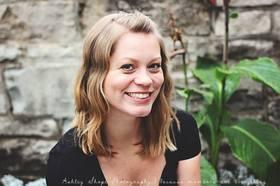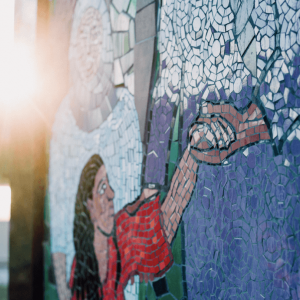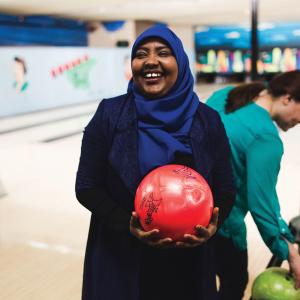
Katie Koranda (@ktkather) is a freelance photographer and writer based in the Twin Cities.
Posts By This Author
First U.S. Memorial to Sexual Assault Survivors Brings Healing Out of Shadows
Against the backdrop of the Minneapolis skyline, three mosaic pillars stand tall on what was once Dakota land. They are inscribed with 11 words: We believe you. We stand with you. You are not alone.
This is the first permanent memorial in the U.S. dedicated to survivors of sexual violence.
Who Is My Neighbor?
Saciido Shaie, a Somali refugee living in Minneapolis, just wants to be part of the American fabric.
SACIIDO SHAIE scrolled through Facebook, stopping at video of a press conference about one of President Trump’s cabinet appointments.
She shook her head and mumbled about his executive order that temporarily barred refugees and immigrants from several Muslim-majority countries—including Somalia—from entering the United States.
Somali immigrants such as Shaie have been arriving in Minnesota since the 1990s. But ever since then-candidate Trump declared that Minnesota has “suffered enough” from accepting Somali refugees, the roughly 50,000 members of the Somali community in the state have become fearful. “This is the first time I have felt uncertain about my life here,” said Shaie, who is Muslim.
Shaie was a child when her family came to the U.S. in 1992 after spending almost a year in a refugee camp in Kenya, but she remembers the civil war in Somalia that led to her family’s flight. As she drove away from her home with her mother, she remembers seeing a baby attempting to nurse from his dead mother’s breast. “Buildings were burning, houses falling down, people dying—just chaos,” she said recently while cooking dinner in her North Minneapolis apartment. “Every time I see scenes from Syria, it reminds me of Somalia.”
Her family owned several stores in Somalia and lived in a large house. She described their life before the conflict as upper-middle class. Now she has three children ranging from 9 to 15 years old. In 2007, she cofounded a nonprofit that empowers Somali youth to be leaders in the community.
Shaie views her family as “100 percent Somali and 100 percent American” and hopes her children feel the same. “My culture is one of those things I can’t live without,” she said. “The more you know your culture and other cultures, the more you’ll be smart, and I want my kids to be smart.”
She wishes more people would understand that the Somali community is peace-loving.
“We’re here to be part of the [American] fabric, and that’s all.”

